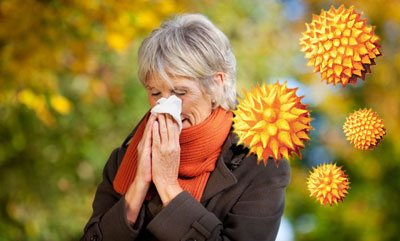BEST WAYS TO PROTECT YOUR EYES FROM SEASONAL EYE ALLERGIES

It’s fall, and along with dropping temperatures and the turning of leaves, a new crop of autumn pollen is sweeping across the country, activating allergy symptoms among over 40 million Americans.
All summer, it was grass pollination that was triggering allergic reactions. Come fall, it is time for weeds to pollinate, and a large assortment of weeds – goldenrod, sagebrush, pigweed and sheep sorrel to name just a few – are causing seasonal eyes-nose-throat irritations.
The worst culprit is of course, ragweed. A single ragweed plant produces more than one billion pollen grains, and these grains can travel up to 400 miles in the wind. And they grow abundantly wherever they can lay down roots: along roads, in vacant lots, in open fields, in your neighbor’s overgrown backyard…
Add to this airborne weed allergen mix, the presence of outdoor mold spores floating in the air, riding on falling leaves, inhabiting the soil and compost piles, rising high during the warmth of the day and then falling back to the ground in the cool of the evening. It’s a lethal fall cocktail of inhalant allergens out there, and no wonder so many of us are experiencing weepy, itchy, swollen eyes, sticky vision from mucus buildup in the corners of the eyelids, and chronic dry eye syndrome.
While there is nothing to be done about the scourge of fall allergies, there are many ways to minimize its impact on your life.
How To Protect Your Eyes From Fall Allergies
• Avoid veggies and fruits like zucchinis, cucumbers, bananas and melons if you are susceptible to ragweed allergy. Other triggers you should be aware of are chamomile tea, sunflower seeds, honey and other types of food that contain pollen from the Compositae family.
• Close windows in your car to keep airborne pollen out, and use the air-conditioner instead. When you first turn on the AC, remember to hold your breath for a short time and leave the windows open so the mold spores collected inside the car can disperse.
• Shower before bed if you have spent a lot of time outdoors. Wash your hair thoroughly too, so you don’t bring allergens into the bed.
• Bathe your pets often. Clean their paws after they’ve been out on a walk or playing in the yard.
• Wear a facemask when you rake fall leaves. Don’t breathe in the leaf dust as they’re probably crawling with allergens.
• Wear sunglasses to protect your eyes, and a hat when you go out, particularly on windy days.
• Don’t hang your laundry out on a clothesline. Use the dryer instead.
• Use an indoor humidifier to guard against dry eyes, and also filter irritants and allergens from the air.
• Purify your indoor air with lots of toxin-absorbing indoor plants.
• Use hypoallergenic eye makeup.
• Carry eye lubricants with you, whenever you go out.
